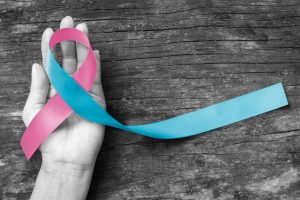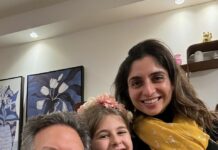Pregnancy loss and infertility can be difficult to talk about and even more difficult to fully heal from.

The impact they have on an expecting mother’s life can be incalculable, and the process of recovery from this grief can be a very personal experience.
Jewish Community Services hopes to make that journey a bit less lonely with its Seeds of Hope program, which offers support to Jewish mothers and their families who are experiencing fertility-related issues.
On May 21, the group will be holding its Planting Seeds of Hope event, which aims to give its members a way to express their feelings in a material way by contributing to a “healing garden” outside the Rosenbloom Owings Mills JCC. Participants will be able to plant new flowers and crops in the garden, symbolizing new life, as well as paint and customize river stones to memorialize their losses.
Michelle Goldberg, senior manager of community engagement and partnerships at JCS, said that the Seeds of Hope program was first created to meet a need these women had that was not properly being met by the resources they had access to.
“They felt that there was not sufficient support in the Jewish community to help them cope,” Goldberg said. “So we created an advisory committee to help provide emotional support and monitoring. We connect people to peers, support education to raise awareness [of fertility loss] and connect families to professionals and rabbis who can help them through this difficult time.”
Though Seeds of Hope as an initiative of JCS is barely two years old, its roots run deep. Forty years ago, following a miscarriage of her own, Rabbi Nina Beth Cardin founded the Pregnancy Loss Support Program for Miscarriage, Stillbirth, and Newborn Death. The group is still active today as a program of the National Council of Jewish Women’s New York section.
Cardin would go on to write “Tears of Sorrow, Seeds of Hope: A Jewish Spiritual Companion for Infertility and Pregnancy Loss” in 1999, a text that served as inspiration for the JCS program’s name. Cardin now sits on its advisory committee, providing spiritual guidance.
“Jewish tradition has been a patriarchal tradition, and while pregnancy loss and infertility affect both members of the couple, it affects the woman more deeply,” Cardin explained. “The patriarchy has not always responded spiritually in the way women needed, so women created their own rituals. Many of those are lost today because they were not properly preserved. What we’re doing today is encouraging women to craft their own spiritual responses to their sense of loss, incompleteness, hope and renewal.”
The Planting Seeds of Hope event was inspired by the creation of these personal rituals, serving as a symbolic gesture. Cardin noted that during the research for her book, she compiled stories of Jewish women who had experienced pregnancy loss in the past, with many of them stating that they found gardening to be very healing.
“We decided that it could be helpful for people’s expressions to express, with their bodies, the feelings they have, of joy shattered and hope lost. But also, a remembrance of what was, even if it was just for a little while,” she said.
Jewish spiritual laws — also known as halachah — regarding pregnancy loss can be difficult to navigate. Burial can be complicated due to the fact that Judaism makes a distinction between underdeveloped fetuses and more developed fetuses. Mikvah.org specifies that Jewish funerals for stillbirths were often very secretive, with families not attending.
“There were a lot of women who had miscarriages who never even knew where their babies were buried,” Goldberg said. “[Halachah scholars in] Israel are starting to come around on changing these laws, but it’s still very complicated. People struggle with choosing whether to follow their beliefs or do what is right for them.”
With that in mind, Goldberg and Cardin both stress that it is important for Seeds of Hope to offer a no-judgment space for these women and their families. But it is just as important for the people around them to offer community support in a similarly nonjudgmental manner.
“It can be lonely, and it can be devastating,” Cardin said. “The garden is a way for the community to embrace those who have felt that pain, to help them put it out there. But it’s somewhere with a sense of hope, because the garden is about renewal. No matter how a family chooses to proceed in the future … there will be new life in whatever fashion it comes to them or how they choose to renew it for themselves.”
Do’s and Don’ts for responding to someone who lost a baby
How do you comfort someone who has lost a baby? Michelle Goldberg offers the following suggestions for approaching this sensitive topic.
Do:
- Say you’re sorry
- Listen and follow their lead
- Check in on them, even if they seem fine
- Ask about the rest of their family
- Offer specific help
- Send a card or small gift
- Use the baby’s name
Don’t:
- Say “It wasn’t a baby yet”
- Say “At least you weren’t further along”
- Say “It wasn’t meant to be”
- Say “Well, at least you can get pregnant”
- Point out that miscarriage happens to a lot of people
- Say that they can always have another baby, or that they at least have other children







